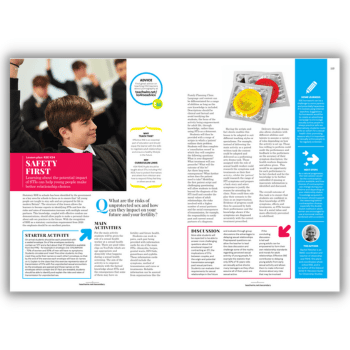Keep calm – De-stressing strategies for teachers

With stress levels continuing to rise across the profession, Gordon Cairns offers some advice for keeping those cortisol levels under control…

When I first started teaching, others considered my levels of stress to be problematic.
If the faculty had recorded staff stress levels on a bar chart pinned to the wall, then I – as the newest member of staff – would be at one end shaded in pale blue, while my principal teacher would be off the scale in crimson red.
My inability to feel anxiety over looming deadlines would actually add to hers – she took my calm demeanour as a sign of indifference, which served to intensify the tension she was already feeling. This could cause problems during interviews, where my similarly relaxed approach would be cited in panel feedback as to why I didn’t get the post.
Thankfully, the world has changed somewhat in the intervening years. While there remain some widely recognised positive effects of stress, constant feelings of inner tension and all the attendant problems are no longer seen as an indicator of caring within the teaching profession, but rather as something that should be minimised to protect our colleagues’ health.
Personal cost
Yet despite the increased understanding around stress, the number of teachers affected by it continues to rise. According to the comprehensive 2019 Teacher Wellbeing Index produced by Education Support – a mental health charity supporting teaching professionals – 72% of education professionals described themselves as stressed, rising to 84% for senior leaders. Those figures reflect the third year-on-year increase in stress levels, as measured by Education Support, since 2016.
The report went on to highlight significant increases in tearfulness, insomnia and difficulties in concentrating amongst teaching professionals. Somewhat worryingly for the future of the profession, NQTs emerged as the group most likely to experience a mental health issue, with around 40% of NQTs reporting that they had endured a mental health episode in the past academic year, compared to a third of all education professionals.
A profession that suffers from endemic stress is ultimately one that’s unsustainable. Between staff burn out, early retirements and exhausted teachers, we’ve reached a point where too many professionals simply aren’t able to give their best for their students each day. More than half of all education professionals have considered leaving the sector in the past two years for reasons related to their health and wellbeing, with workload pressures and a sense of not feeling valued cited as the two major reasons.
Then there’s the personal cost. In extreme cases, stress can give rise to cases of depression or even symptoms of post-traumatic stress disorder. Underlying chronic stress can meanwhile cause a range of long-term physical health issues, and heighten the risks of suffering from heart attacks, stroke, diabetes and weight gain. Less extreme cases can still result in constant tiredness, a lack of motivation, problems with digestion and a daily life that’s simply more miserable than it should be.
The knowledge chasm
In some cases, the 2020 lockdown will have presented some teachers with an opportunity to recharge their batteries and rediscover positive habits that help them relax. However, further reporting from Education Support has found that 49% of secondary teachers expressed higher levels of stress and anxiety at the start of the summer term than usual – not just due to fears of contracting COVID-19 but also over the uncertainties that have surrounded many teachers’ return to on site work, and the subsequent impact of lockdown on students’ exam results.
The largest contributor to teacher stress amid this ‘new normal’ may well be the new knowledge chasm forged from students’ differing levels of educational engagement during lockdown. Moving these newly formed, multi-differentiated classes forward at differing paces, whilst simultaneously adjusting to the brave new world of social distancing and staggered start times, will doubtless cause some anxiety amongst even the most relaxed.
Unfortunately, what’s likely to stay the same is the expectation that teachers will have to deal with this themselves, by meeting the inevitable stress-inducing challenges head-on and building up their levels of resilience.
Underlying causes
The first step in dealing with stress is to recognise when are indeed experiencing it, since many of its symptoms can be confused with other conditions. That muscular tension that can be created by feelings of stress may well result in headaches, chest or muscular pains, but simply reaching for an anti-inflammatory won’t tackle the underlying cause.
Similarly, many will sooner blame stress-related diarrhoea, constipation or vomiting on a stomach problem, rather than the latest demands of your leadership team. Taking an Imodium will therefore only serve to mask the real problem.
Below is a list of tips for incorporating wellbeing elements into your daily routine which, over time, can easily form into positive habits and strengthen your overall resilience to stress.
1. Move more Scientific evidence suggests that exercising boosts hormones that act to lower perceived levels of stress. Sometimes simply being in your school environment can heighten your stress levels, but it may also provide the facilities for reducing them.
Almost every secondary school now has some form of fitness suite, variously equipped with running, cycling and rowing machines. Many also have swimming pools, and without exception, every school estate has its own gym hall. Each of these provides opportunities for reducing stress. If you don’t like working out alone, chances are that football, badminton and netball games are already taking place among the staff at your school; if not, they can be easily organised.
If possible, try cycling or walking to work instead of driving. Not only will this lower stress through the exercise you’re getting, it can also provide you with valuable head space before starting work in the morning, and a means of unwinding on the way home.
2. Put on some tunes Studies seem to bear out the notion that putting on some chilled music helps us feel more relaxed. Regular music listening has been found to alter the chemicals involved in our stress response and lower our blood glucose. Thanks to modern mobile devices, most of us can easily carry a vast catalogue of music with us on our phones, ready for access wherever we are. If you’re not currently in the habit of listening to music regularly, try setting a reminder on your phone to encourage you to play music more often when you’re not teaching, and see how you get on.
3. Join in with the jokes As school staffroom regulars know all too well, these outwardly mundane spaces are frequently occupied by purveyors of the darkest humour you’ll anywhere outside of a stand-up comedy club. A 2008 study by Dr Lynnette Mawhinney, ‘Laugh so you don’t cry,’ examined lunch hour staff room interactions, and the role humour played in combating stress among teachers. By triggering the release of dopamine in the brain, these humorous exchanges between staff prevented them from dwelling on stressful school-related events. Laughing together over shared classroom experiences was also found to help teachers strengthen their social support network, making them more resilient.
4. Start meditating Meditating even for short periods can trigger brain-changing effects that reduce stress. Studies have found that practising mindfulness strategies for two months can have the same effect on lowering anxiety levels and improving emotional control as those experienced by long term practitioners. Another advantage of meditation is that you don’t need to go anywhere special – you just need a quiet space where you won’t be interrupted – nor do you have don any special clothing and get sweaty. A daily five minute session can be enough to have a positive impact on your stress levels.
Gordon Cairns is an English and forest school teacher who works in a unit for secondary pupils with ASD; he also writes about education, society, cycling and football for a number of publications












